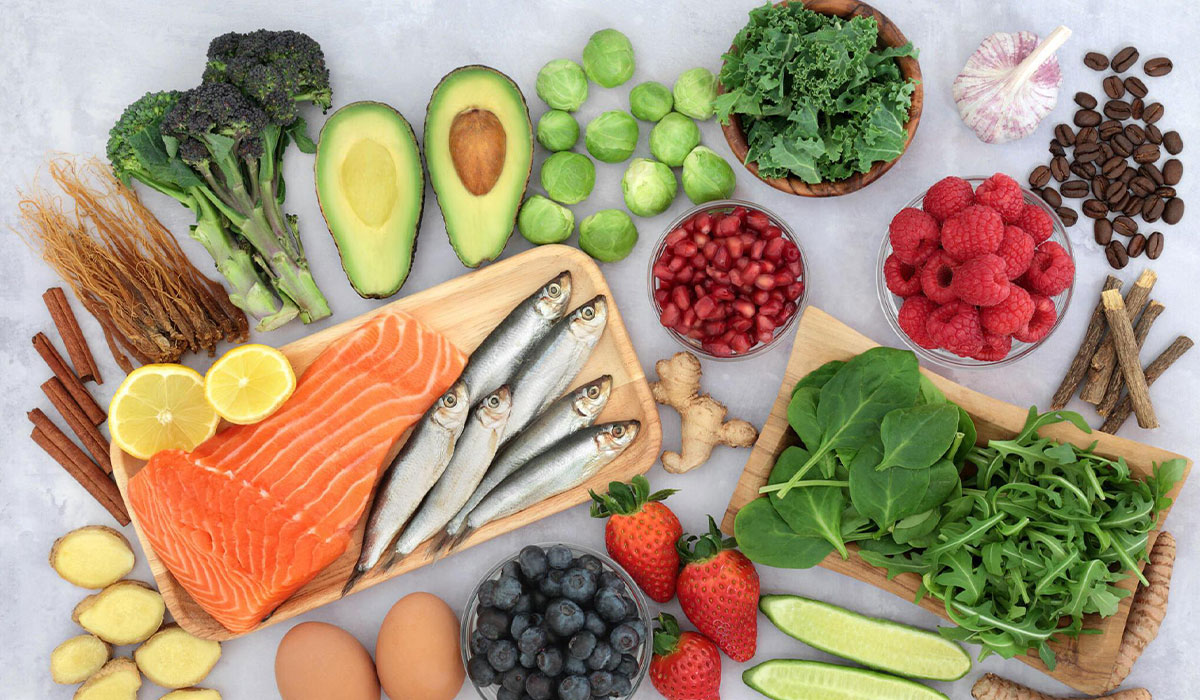The anti-inflammatory diet is a way of eating that focuses on consuming foods that help reduce inflammation in the body. Inflammation is the body’s natural response to injury or illness, but chronic inflammation can contribute to various health issues such as heart disease, diabetes, and arthritis. The diet emphasizes whole foods that are rich in antioxidants, healthy fats, and omega-3 fatty acids, while excluding processed foods, sugary drinks, trans fats, and excessive salt. By following an anti-inflammatory diet, individuals can potentially improve their overall health and reduce the risk of chronic diseases.
What is an Anti-Inflammatory Diet?
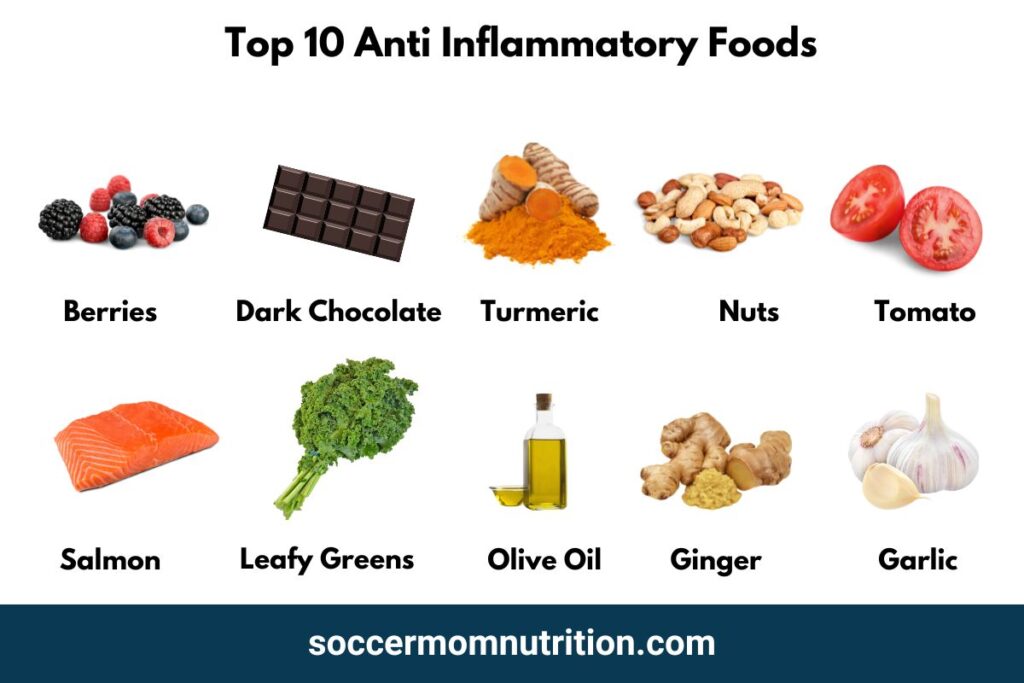
An anti-inflammatory diet is a way of eating that focuses on consuming foods that help reduce inflammation in the body. It emphasizes whole foods that are rich in antioxidants, healthy fats, and omega-3 fatty acids. By incorporating foods like fruits, vegetables, nuts, seeds, fish, and olive oil, individuals can potentially decrease inflammation and improve their overall health. This diet aims to reduce the consumption of processed foods, sugary drinks, trans fats, and excessive salt, which are known to contribute to inflammation. Following an anti-inflammatory diet can help individuals manage chronic diseases and promote optimal health.
Benefits of Following an Anti-Inflammatory Diet
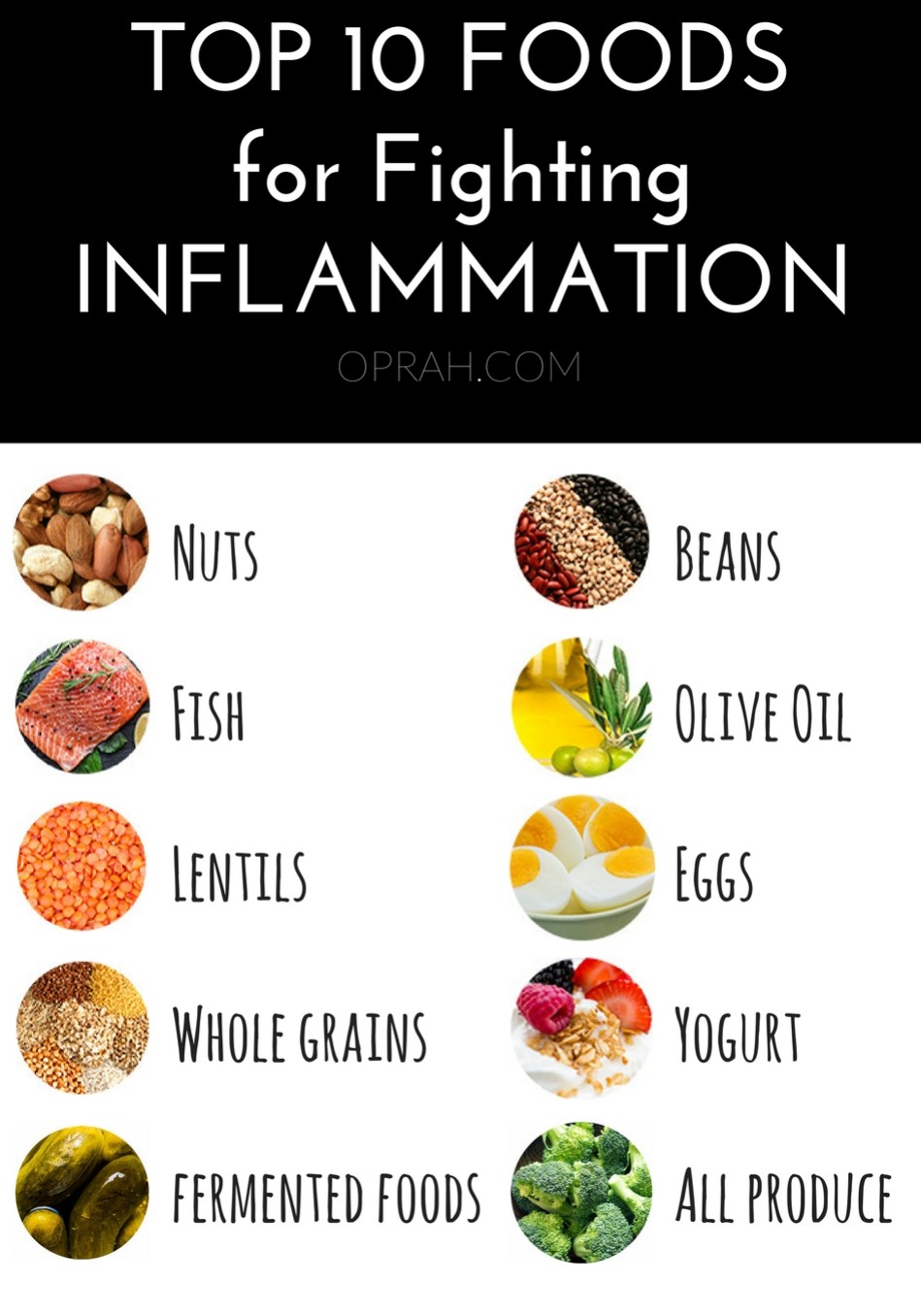
Following an anti-inflammatory diet can have numerous benefits for overall health. It can help reduce the risk of chronic diseases such as heart disease, diabetes, and certain types of cancer. This diet may also help manage symptoms of inflammatory conditions like rheumatoid arthritis and inflammatory bowel disease. Additionally, an anti-inflammatory diet can promote weight loss and improve gut health by supporting the growth of beneficial gut bacteria. Incorporating anti-inflammatory foods into your diet can boost your immune system, improve digestion, and enhance overall well-being. By prioritizing nutrient-rich foods, individuals can reap the many benefits of an anti-inflammatory diet.
Foods to Include in an Anti-Inflammatory Diet
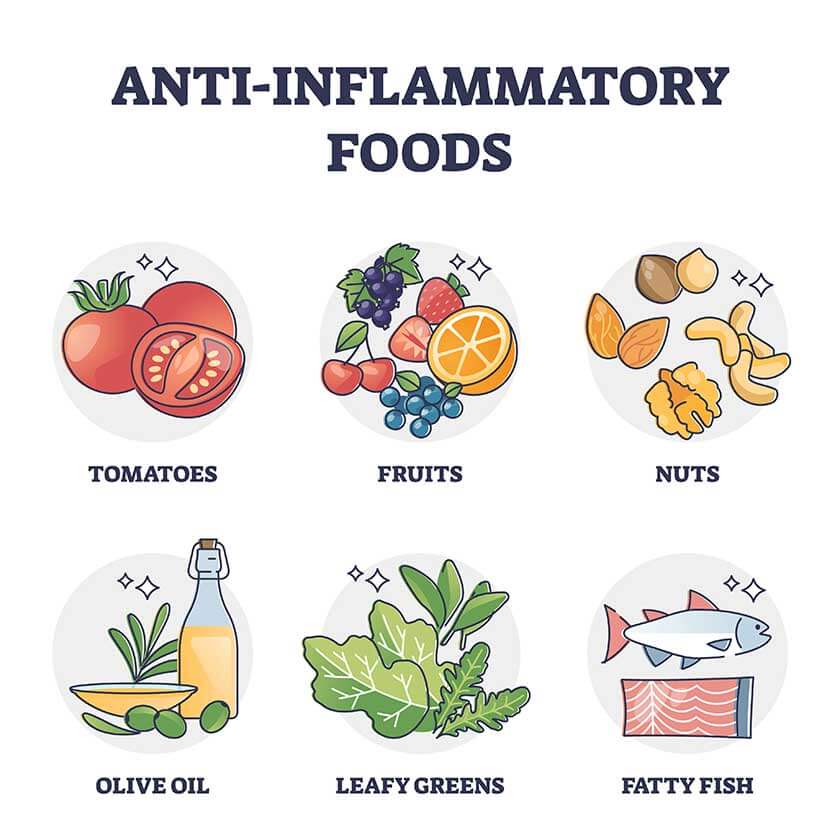
An anti-inflammatory diet focuses on including foods that are known for their anti-inflammatory properties. This includes plenty of vegetables and fruits that are rich in antioxidants, such as leafy greens, berries, and citrus fruits. Healthy fats, like those found in avocados, nuts, and olive oil, are also beneficial for reducing inflammation. Omega-3 fatty acids, found in fatty fish like salmon and mackerel, can further support an anti-inflammatory diet. These foods provide essential nutrients and can help reduce inflammation in the body, promoting overall health and well-being.
Vegetables and Fruits rich in Antioxidants

In an anti-inflammatory diet, it is important to include plenty of vegetables and fruits that are rich in antioxidants. These powerful compounds help combat free radicals and reduce inflammation in the body. Some examples of antioxidant-rich vegetables include leafy greens like spinach and kale, colorful veggies like bell peppers and tomatoes, and cruciferous vegetables like broccoli and cauliflower. When it comes to fruits, opt for berries like blueberries and strawberries, as well as citrus fruits like oranges and grapefruits. These vibrant and nutritious foods not only add flavor to your meals but also provide essential nutrients that support a healthy inflammatory response in the body.
Healthy Fats and Omega-3 Sources
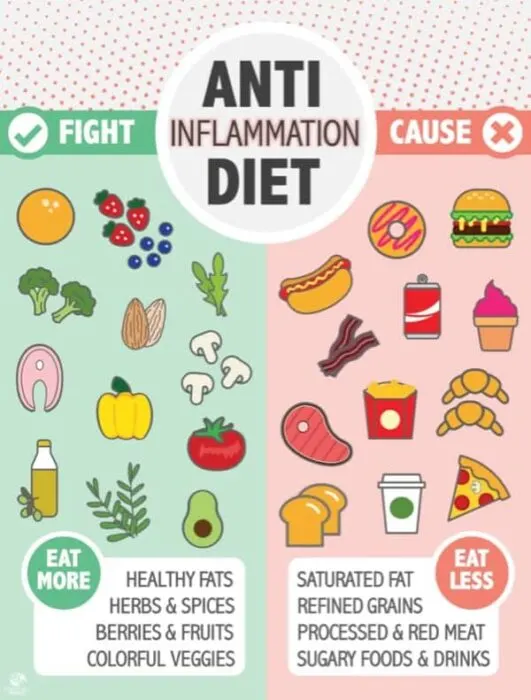
In an anti-inflammatory diet, it is important to include healthy fats and sources of omega-3 fatty acids. These fats have been shown to have anti-inflammatory properties and can help reduce inflammation in the body. Good sources of healthy fats include olive oil, avocados, nuts, and seeds. These fats provide essential nutrients and can be used in cooking or as a topping for salads and dishes. Omega-3 fatty acids, which are found in fatty fish like salmon, mackerel, and sardines, are highly beneficial for reducing inflammation. Adding these foods to your diet can help promote a healthy inflammatory response and support overall well-being.
Foods to Avoid in an Anti-Inflammatory Diet

To effectively follow an anti-inflammatory diet, it is important to avoid certain foods that can promote inflammation in the body. Processed foods, such as packaged snacks, fast food, and sugary drinks, should be limited or eliminated from the diet. These foods are often high in added sugars, unhealthy fats, and additives, which can trigger inflammation. Trans fats, found in fried foods and baked goods, should also be avoided as they can increase inflammation in the body. Excessive salt intake can also contribute to inflammation, so it is advisable to limit consumption of highly processed and salty foods. By avoiding these inflammatory foods, you can support your body’s natural healing processes and reduce inflammation levels.
Processed Foods and Sugary Drinks
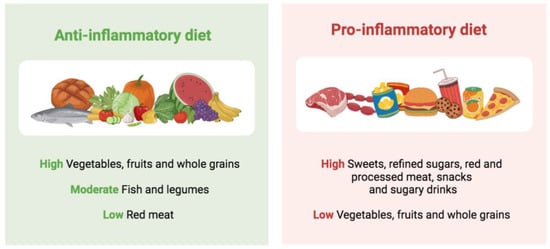
Processed foods and sugary drinks should be avoided in an anti-inflammatory diet. These types of foods are often high in added sugars, unhealthy fats, and additives, which can trigger inflammation in the body. Processed snacks, fast food, and sugary drinks may provide temporary satisfaction, but they can have detrimental effects on overall health. Consuming these foods regularly can lead to weight gain, increased inflammation levels, and a higher risk of chronic diseases. Opting for whole, unprocessed foods is a better choice to reduce inflammation and support overall health.
Trans Fats and Excessive Salt Intake
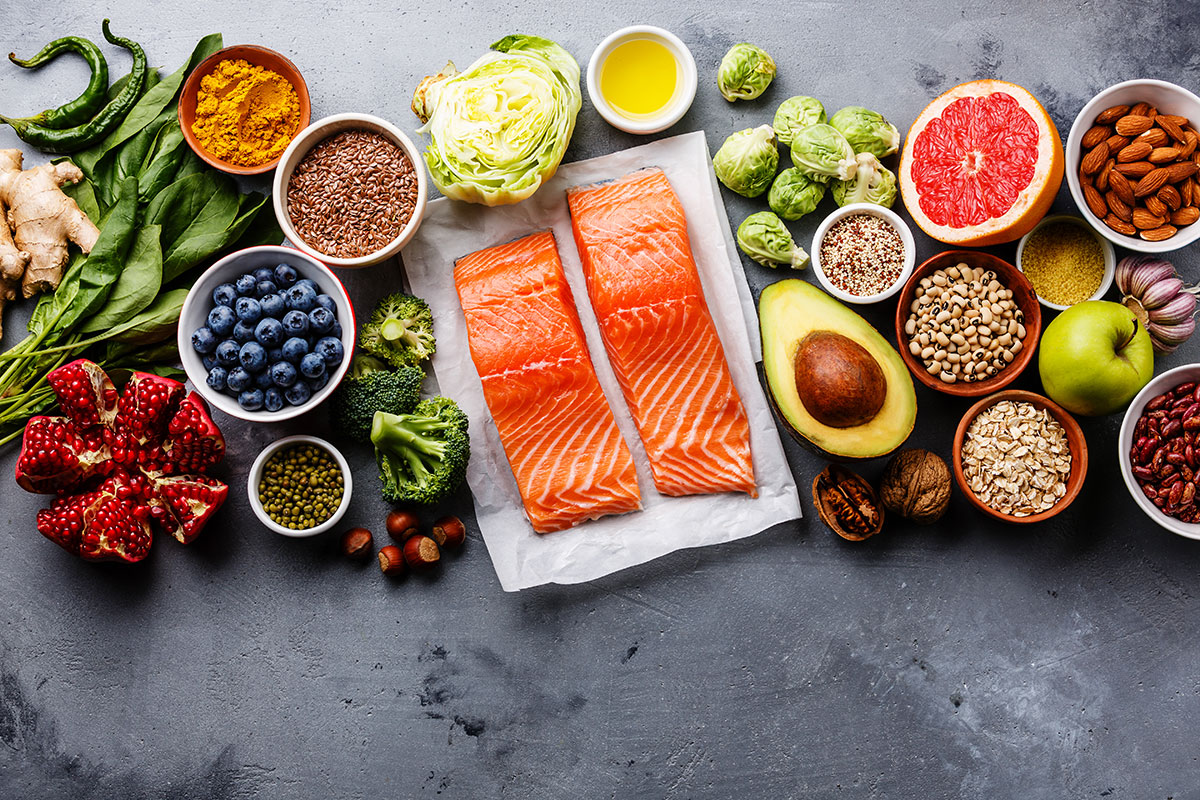
Trans fats are a type of unhealthy fat found in fried and processed foods. These fats can increase inflammation in the body and raise the risk of chronic diseases like heart disease and diabetes. Therefore, it is crucial to avoid foods containing trans fats, such as fast food, packaged snacks, and baked goods.
Similarly, excessive salt intake can also contribute to inflammation. High levels of sodium can lead to fluid retention and increase blood pressure, which can further exacerbate inflammation. It is recommended to limit salt intake and opt for natural flavorings like herbs and spices instead.
By avoiding trans fats and reducing salt intake, individuals can reduce inflammation and promote better overall health.
Tips for Following an Anti-Inflammatory Diet

- Plan and Prepare Meals: It’s essential to plan your meals in advance to ensure you have balanced and nutritious options. Make a grocery list and prep ingredients ahead of time to save time during busy weekdays.
- Opt for Whole Foods: Focus on consuming whole, unprocessed foods. These include fruits, vegetables, whole grains, lean proteins, and healthy fats. These foods are rich in antioxidants and anti-inflammatory compounds.
- Incorporate Variety: Experiment with different fruits, vegetables, and grains to keep your meals interesting and maximize nutrient intake. This will ensure you’re getting a wide range of vitamins, minerals, and phytochemicals.
- Read Food Labels: Take the time to read food labels when grocery shopping. Avoid products that contain trans fats, high levels of sodium, or added sugars. Choose foods with minimal ingredients and opt for healthier alternatives.
- Stay Hydrated: Drink plenty of water throughout the day to stay hydrated. Water helps flush out toxins and supports the body’s natural functions. Limit your consumption of sugary drinks and opt for herbal tea or infused water.
- Practice Mindful Eating: Slow down and savor your meals. Mindful eating can help you recognize your body’s hunger and fullness cues, preventing overeating. Focus on the taste, texture, and aroma of your food to enhance the dining experience.
- Limit Alcohol and Caffeine Intake: Both alcohol and caffeine can contribute to inflammation in some individuals. While moderate consumption is acceptable for most, it’s important to listen to your body and make adjustments as needed.
- Manage Stress Levels: High-stress levels can lead to increased inflammation in the body. Incorporate stress-reducing activities into your routine, such as meditation, yoga, or deep breathing exercises.
By following these tips, you can incorporate an anti-inflammatory diet into your lifestyle and reap its numerous health benefits.
Meal Planning and Preparation Tips
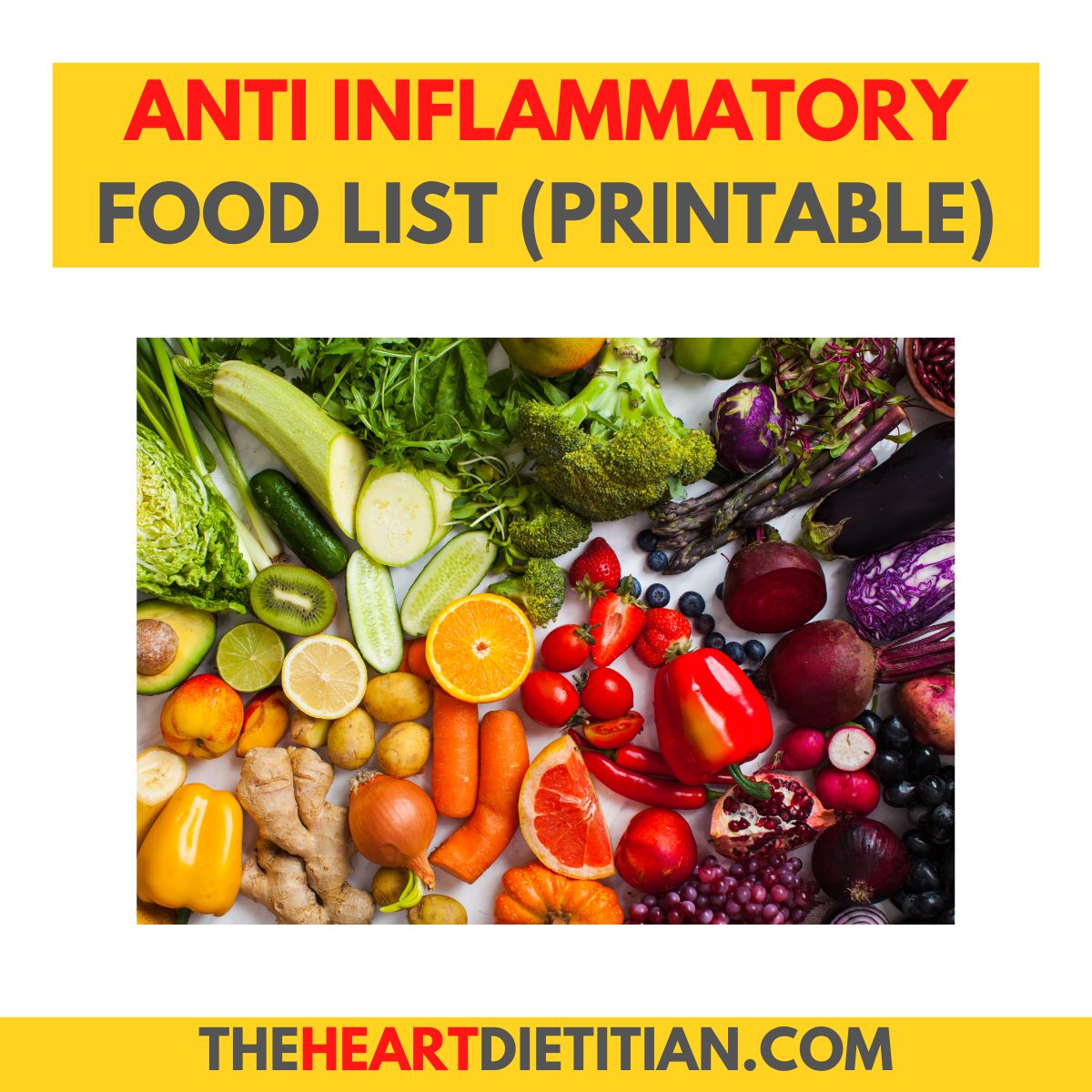
When following an anti-inflammatory diet, meal planning and preparation can make a significant difference. Here are some tips to help you with this process:
- Plan your meals in advance: Take some time to plan out your meals for the week. This will help ensure that you have all the necessary ingredients and can avoid last-minute unhealthy food choices.
- Batch cook and meal prep: Consider batch cooking on weekends and preparing meals in advance. This will save time during the week and make it easier to stick to your diet plan.
- Include a variety of foods: Aim to include a wide range of fruits, vegetables, whole grains, lean proteins, and healthy fats in your meals. This will not only make your meals more enjoyable but also provide a diverse range of nutrients.
- Use herbs and spices: Experiment with using herbs and spices to add flavor to your dishes instead of relying on salt or processed sauces. This will enhance the taste of your meals without adding unnecessary inflammation-promoting ingredients.
- Make use of leftovers: Don’t let leftovers go to waste. Use them creatively in other dishes or as a base for a new meal. This will help you save time and reduce food waste.
By incorporating these meal planning and preparation tips, you can simplify your anti-inflammatory diet and ensure that you have nutritious and delicious meals readily available.
Incorporating Herbs and Spices for Flavor

Incorporating herbs and spices is a great way to add flavor to your anti-inflammatory meals. Not only do they enhance the taste, but many herbs and spices also offer anti-inflammatory properties themselves. For example, turmeric contains curcumin, a powerful anti-inflammatory compound. Garlic and ginger also have anti-inflammatory effects. Dried herbs like oregano, thyme, and rosemary are packed with antioxidants that can help reduce inflammation. Experimenting with different combinations of herbs and spices can make your meals more enjoyable without needing to rely on unhealthy flavorings. So, get creative and season your dishes with these natural and inflammation-fighting ingredients.
Anti-Inflammatory Diet and Overall Health
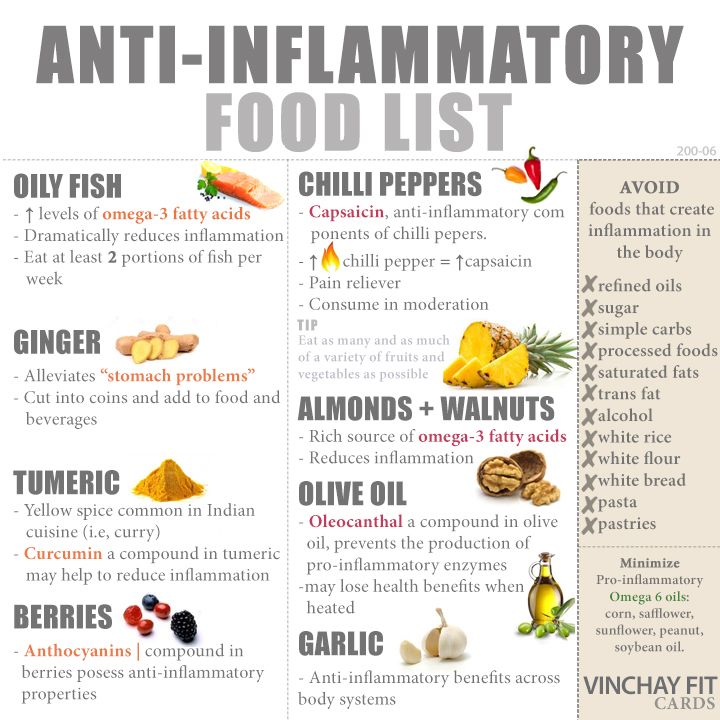
The anti-inflammatory diet not only has the potential to reduce inflammation in the body, but it can also have a positive impact on overall health. Studies have shown that following an anti-inflammatory diet can help reduce the risk of chronic diseases such as heart disease, diabetes, and certain types of cancer. Additionally, this diet can support weight management and improve gut health. By incorporating nutrient-rich foods and avoiding inflammatory triggers, individuals can experience improved energy levels, better digestion, and a strengthened immune system. It is important to consult healthcare professionals and dietitians for personalized advice on implementing and maintaining an anti-inflammatory diet.
Impact of Anti-Inflammatory Diet on Chronic Diseases
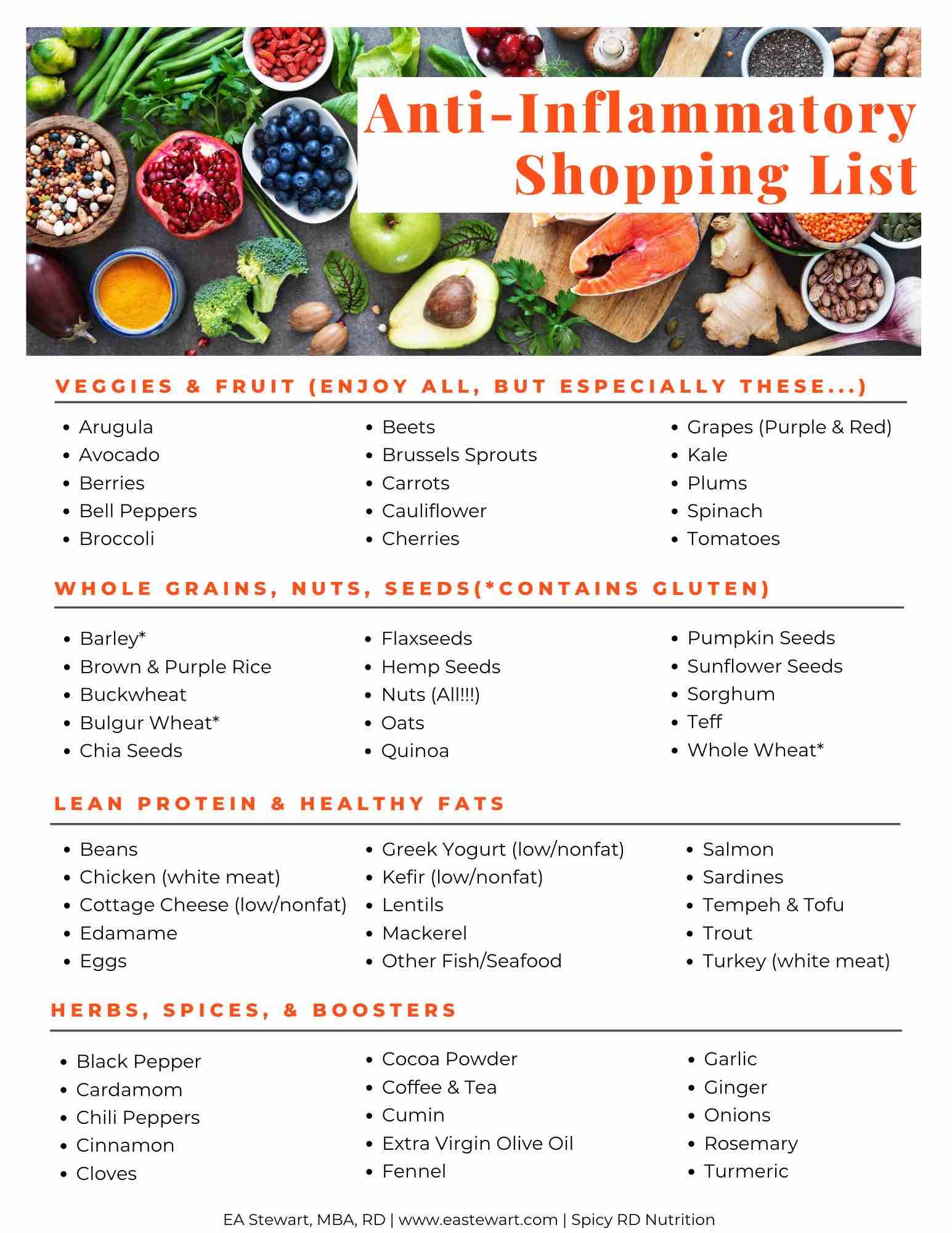
An anti-inflammatory diet has been shown to have a significant impact on chronic diseases. By reducing inflammation in the body, this diet can help lower the risk of conditions such as heart disease, diabetes, and certain types of cancer. Inflammation is a major contributor to the development and progression of these diseases, and adopting an anti-inflammatory diet can help prevent or manage them. By incorporating foods rich in antioxidants and nutrients, individuals can support their overall health and reduce the risk of chronic conditions associated with inflammation. Implementing an anti-inflammatory diet is a proactive step towards improving long-term health.
Weight Management and Gut Health

Weight management and gut health are two important aspects that can be positively influenced by an anti-inflammatory diet. This type of diet promotes healthy weight management by emphasizing whole foods and limiting processed and sugary foods. By reducing inflammation in the body, an anti-inflammatory diet can support a healthy gut microbiome, which plays a crucial role in digestion, nutrient absorption, and overall immune function. A healthy gut is also associated with lower levels of inflammation and improved weight control. Incorporating anti-inflammatory foods and maintaining a balanced diet can contribute to both weight management and gut health.
Conclusion and Practical Advice

In conclusion, adopting an anti-inflammatory diet can have numerous benefits for both weight management and gut health. By incorporating a variety of fruits, vegetables, and healthy fats, individuals can reduce inflammation in their bodies and support a healthy gut microbiome. It is important to avoid processed foods, sugary drinks, trans fats, and excessive salt intake, as these can contribute to inflammation. To follow an anti-inflammatory diet successfully, individuals should focus on meal planning, incorporating herbs and spices for flavor, and seeking guidance from healthcare professionals and dietitians. By making these changes, individuals can improve their overall health and well-being.
Key Takeaways from Anti-Inflammatory Diet
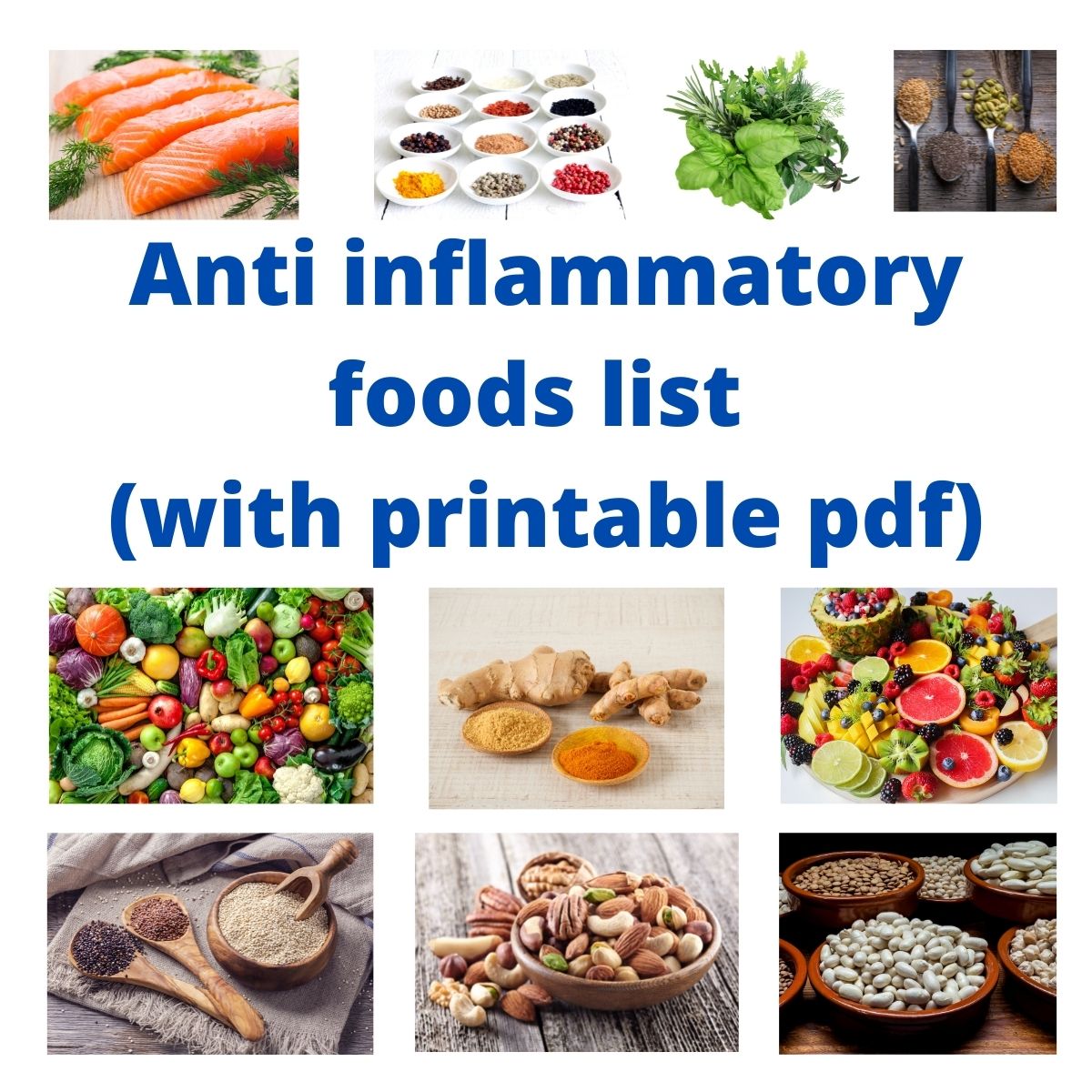
Consuming an anti-inflammatory diet can have various benefits for overall health. The key takeaways from following an anti-inflammatory diet include reducing inflammation in the body, supporting a healthy gut microbiome, and promoting weight management. By incorporating a variety of antioxidant-rich vegetables and fruits, as well as healthy fats and omega-3 sources, individuals can combat inflammation. It is crucial to avoid processed foods, sugary drinks, trans fats, and excessive salt intake, as these can contribute to inflammation. Following an anti-inflammatory diet requires planning, incorporating herbs and spices for flavor, and seeking guidance from healthcare professionals and dietitians.
Consultation with healthcare professionals and dietitians
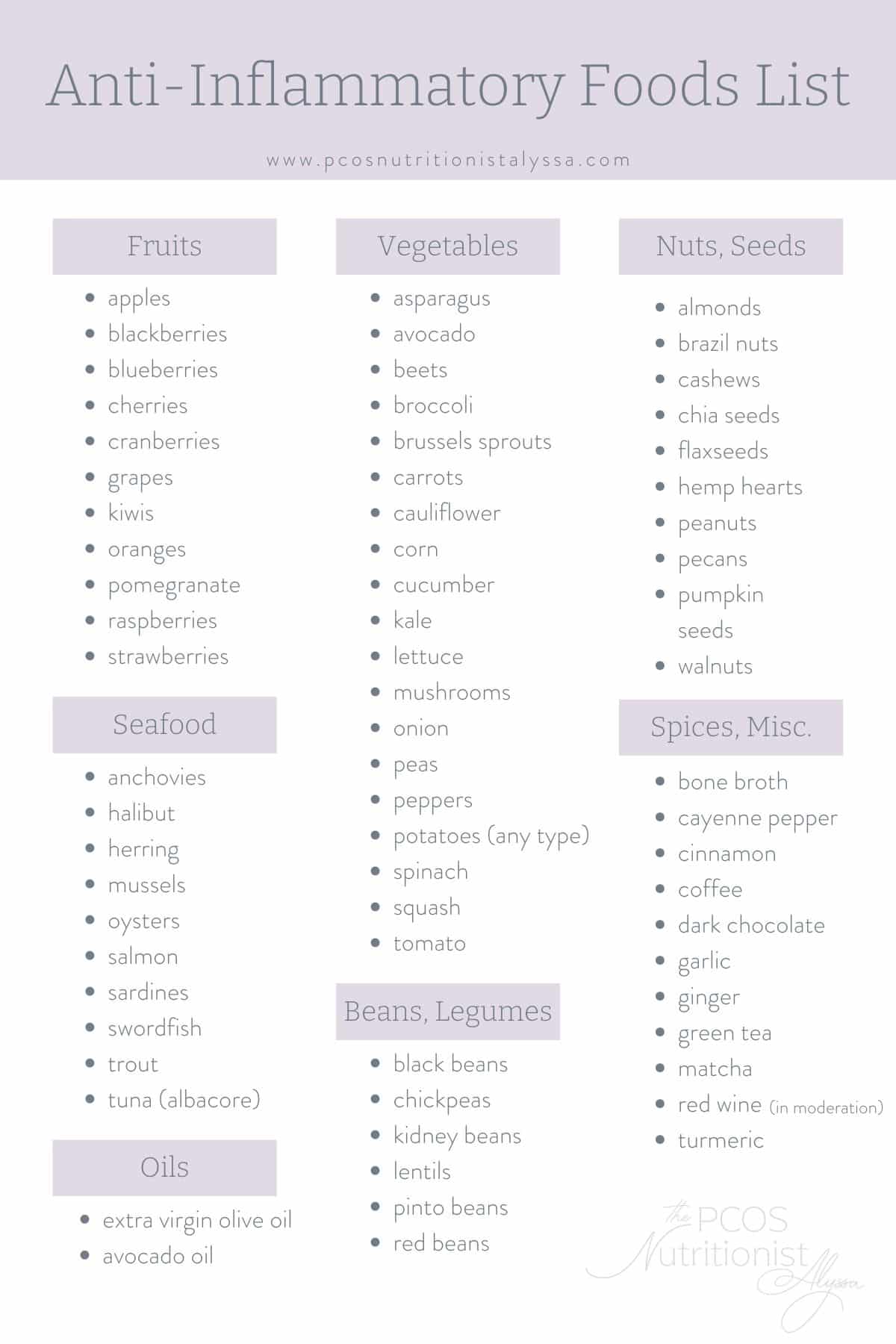
When it comes to following an anti-inflammatory diet, it is always beneficial to seek guidance from healthcare professionals and registered dietitians. These experts can provide personalized advice based on your specific health needs and goals. They can analyze your current diet, recommend appropriate modifications, and monitor your progress. They can also help you navigate any potential challenges, answer your questions, and ensure that you are getting all the necessary nutrients while following the anti-inflammatory eating plan. Consulting with healthcare professionals and dietitians adds a layer of expertise and support to your journey towards better health.
For More Blogs visit Aerns

